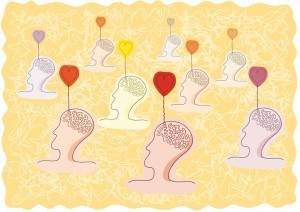“Just as violence often breeds more violence, kindness often leads to more kindness. Individuals such as Mother Teresa and Gandhi have had a huge impact on the world with their kindness. Each one of us has the opportunity to impact many people with our kindness toward ourselves and others.”
While having an impact on the world is certainly a high–perhaps highest–priority, being kind also helps the individual, Dr. Paul says, by increasing our self worth and improving our relationships with others around us. My own acts of kindness over the last few days have been small–compared to the kindnesses others have mentioned embarrassingly so. Yesterday I went out of my way to thank someone. Today, although I had to set aside an important (to me) project, I spent an hour helping someone. In each case, I felt an inner glow.
 In her article, Dr. Paul talks about a business executive who gave all employees with children in college $2000 per year per child for educational expenses. The executive’s awe-inspiring generosity would, of course, be impossible for most of us to emulate. But I don’t think our gestures need be so grand. The small kindnesses we do each day–maintaining a mindset that allows for and encourages daily kindness–truly can be life-changing, and not only for us. A smile, a small favor, a thank you–these seemingly insignificant gestures are infectious; they have a butterfly effect.
In her article, Dr. Paul talks about a business executive who gave all employees with children in college $2000 per year per child for educational expenses. The executive’s awe-inspiring generosity would, of course, be impossible for most of us to emulate. But I don’t think our gestures need be so grand. The small kindnesses we do each day–maintaining a mindset that allows for and encourages daily kindness–truly can be life-changing, and not only for us. A smile, a small favor, a thank you–these seemingly insignificant gestures are infectious; they have a butterfly effect.
In 2011, Dave and I rented an apartment in southern California. I was immediately struck by the kindness of the people in our small so-Cal community. Dave and I walk every day. Over the years, we’d become accustomed to power plays–if we tucked in, the person, couple or group coming toward us would often spread out to show dominance and control; and so many vehicles sped up as we stepped off the curb that I often wondered if we’d make it home alive. Walks, which should have relieved anxiety, too often left me feeling anxious and sour.
In California, people smiled and stepped aside when someone approached from the other direction. Drivers stopped to let us go, even when they didn’t have to, and people in stores invariably greeted us with a friendly smile. Maybe the sun makes people happy. I heard that a lot. Friends back East usually insisted the gestures were fake, a shallow sort of nice. Here’s my response: I don’t care. I left the apartment smiling and returned feeling refreshed, ready to dig in and start my day. It made a difference in my outlook and in the way I responded to others. I found that I smiled easier; I was more patient.
Now, living in Cambridge, MA, I’m finding our neighbors to be friendly and kind, and I realize that I was part of the problem. In high school, my family moved from Pennsylvania to Massachusetts, where the other kids laughed at me, saying I was too nice. I learned to rein myself in, wipe the goofy grin off my face. Although I’ll admit I’m not always successful, I’m trying to be that kinder, gentler person I became in the short time we lived in Orange County. Maybe, as Dr. Paul’s male patient fears, some people will see me as weak, someone to be stepped on. Or maybe people will keep smiling back.
Why not join us for 26 Days of Kindness, inspired by Ann Curry’s #26acts?


A great article, Terri and I'm so glad you kept your sincere smile!
Being kind is something not be laughed at. Though there may be negative effects at times because people will tend to abuse you, at the end of the day, it still feels good if you know you have done good before you sleep and you become a kinder person each day. It gives a different feeling of peace and satisfaction.
Thank you so much!
Whatever people say or treat us, we should never be unkind or ungrateful to anyone. Be good to even those who are clever, selfish and they would never cheat you.
I have seen being bad to someone is like giving yourself punishment. Whenever I am angry with someone, its like killing yourself, and whenever I forgive someone, the kind act makes us so light and refreshed.